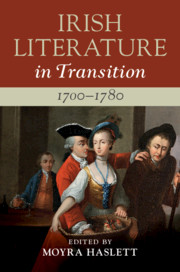Book contents
- Irish Literature in Transition, 1700–1780
- Irish Literature in Transition
- Irish Literature in Transition, 1700–1780
- Copyright page
- Contents
- Illustrations
- Contributors
- Series Preface
- General Acknowledgements
- Introduction
- Part I Starting Points
- Part II Philosophical and Political Frameworks
- Part III Local, National, and Transnational Contexts
- Chapter 7 Land and Landscape in Irish Poetry in English, 1700–1780
- Chapter 8 The Idea of an Eighteenth-Century National Theatre
- Chapter 9 Transnational Influence and Exchange: The Intersections between Irish and French Sentimental Novels
- Chapter 10 ‘An Example to the Whole World’: Patriotism and Imperialism in Early Irish Fiction
- Part IV Gender and Sexuality
- Part V Transcultural Contexts
- Part VI Retrospective Readings
- Index
Chapter 7 - Land and Landscape in Irish Poetry in English, 1700–1780
from Part III - Local, National, and Transnational Contexts
Published online by Cambridge University Press: 28 February 2020
- Irish Literature in Transition, 1700–1780
- Irish Literature in Transition
- Irish Literature in Transition, 1700–1780
- Copyright page
- Contents
- Illustrations
- Contributors
- Series Preface
- General Acknowledgements
- Introduction
- Part I Starting Points
- Part II Philosophical and Political Frameworks
- Part III Local, National, and Transnational Contexts
- Chapter 7 Land and Landscape in Irish Poetry in English, 1700–1780
- Chapter 8 The Idea of an Eighteenth-Century National Theatre
- Chapter 9 Transnational Influence and Exchange: The Intersections between Irish and French Sentimental Novels
- Chapter 10 ‘An Example to the Whole World’: Patriotism and Imperialism in Early Irish Fiction
- Part IV Gender and Sexuality
- Part V Transcultural Contexts
- Part VI Retrospective Readings
- Index
Summary
This chapter builds on the pioneering work of John Wilson Foster (‘Encountering Traditions’, in Nature in Ireland: A Scientific and Cultural History, ed. John Wilson Foster (Dublin: Lilliput, 1997) and John Waters (‘Topographical Poetry and the Politics of Culture in Ireland, 1772–1820’, in Romantic Generations, ed. Ghislaine McDayter, Guinn Batten, and Barry Milligan (Lewisbury: Bucknell University Press, 2001)), both of whom considered the ways in which English-language poets of the eighteenth century wrote about Irish land and landscape. The essay looks at poems written to celebrate the world of English-speaking owners of Irish farms and estates – vistas and pleasure gardens for instance – and poems about activities taking place in the countryside – gardening, farming, hunting, and team sports. Verses praising the wildness of untamed nature are also considered as are poems on violent events such as storms and extended frosts. The poems raise practical, theological, and aesthetic issues in both pastoral and mock-pastoral modes as well as in the emerging genre of ‘picturesque’ poetry. The chapter also considers popular poetry, such as demotic verse about country life, and indicates that, for some poets – Goldsmith and Laurence Whyte for instance – life in rural Ireland was not always idyllic.
- Type
- Chapter
- Information
- Irish Literature in Transition, 1700–1780 , pp. 151 - 170Publisher: Cambridge University PressPrint publication year: 2020

